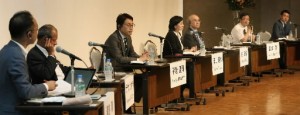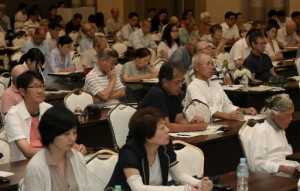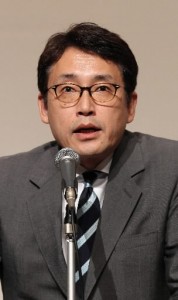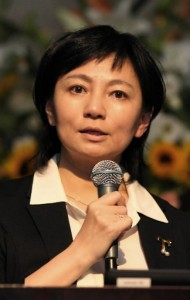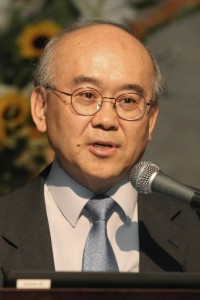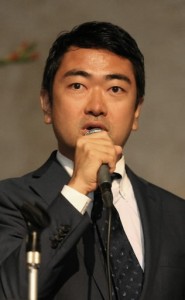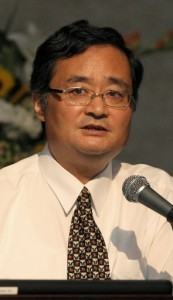International symposium: Security Challenges and Agendas in East Asia: Searching for “A World without Nuclear Weapons”
Aug. 1, 2016
by Rie Nii, Yumi Kanazaki, Hidetoshi Arioka, Yuji Yamamoto, and Eriko Shintani, Staff Writers
Photos by Yutaka Imada
Presenters
Keynote Speaker
Shunji Hiraiwa, Professor, Kwansei Gakuin University
Panelists
Rumi Aoyama, Professor, Waseda University
Haksoon Paik, Vice-President, Sejong Institute
Satoshi Hirose, Vice-Director, Research Center for Nuclear Weapons Abolition, Nagasaki University
Uzaemonnaotsuka Tokai, Editorial Writer, Chugoku Shimbun
Moderators
Takeshi Yuasa, Professor, Hiroshima Peace Institute, Hiroshima City University
Narayanan Ganesan, Professor, Hiroshima Peace Institute, Hiroshima City University
--------------------
Conveying voices from A-bombed cities to the world
An international symposium titled “Security Challenges and Agendas in East Asia: Searching for ‘A World without Nuclear Weapons’” was held at the International Conference Center Hiroshima on July 23. U.S. President Barack Obama made a historic visit to Hiroshima in May, adding momentum for pursuing a world without nuclear weapons. On the other hand, North Korea’s fourth nuclear test has darkened the outlook for a nuclear-weapon-free East Asia. Taking stock of the current situation, the participants looked closely at the viewpoints of North Korea and China and discussed ways to open a path to communication and negotiation with North Korea, which is essential for resolving its nuclear ambitions. The event was sponsored by Hiroshima City University, the Nagasaki University Research Center for Nuclear Weapons Abolition, and the Chugoku Shimbun. A total of 235 people were in attendance.
Keynote Speech by Shunji Hiraiwa
Clear understanding of Kim Jong-un regime is vital
When contemplating North Korea’s nuclear ambitions, we must consider how we should deal with the Kim Jong-un regime or whether we can really negotiate with him at all. Let us look at this in terms of the Congress of the Workers’ Party of Korea held by North Korea in May.
The congress was convened for the first time in 36 years. From around 1990, Kim Jong-un’s predecessor Kim Jong-il believed that he could preserve his regime if he maintained the military at the end of the political changes, thus having a crisis management system sticking to its “military-first politics.”
At the congress, to show that the critical situation has come to an end and the country is now back in peacetime, Kim Jong-un created the new post of chairman of the party. He wore a western suit instead of a Mao jacket. During the Supreme People’s Assembly held in June, its National Defense Commission, which was the symbol of the nation’s military-first politics, was disbanded and the State Affairs Commission was created.
Why did he conclude that the country has returned to peacetime? Because he believes that the nation has enough capability to strike the U.S. after it conducted its fourth nuclear test in January and launched a de facto ballistic missile in February. After the end of the Cold War, North Korea questioned whether the then Soviet Union and China would protect it under their nuclear umbrella. Then it decided that it should possess nuclear weapons.
Now the country has nuclear technology and calls itself a nuclear superpower of the east. During the Congress of the Workers’ Party, Kim Jong-un declared that if North Korea is accepted as a nuclear weapon state, it will act as a responsible nuclear power, sticking to a “no first use” policy and making efforts for denuclearization.
North Korea had another crisis, which was its economic situation. There used to be reports that people were dying of starvation because of food shortages, as the economy has not been in particularly good condition. But it has still maintained an annual economic growth rate of one percent over the past several years, according to the Bank of Korea. North Korea has been able to weather U.N. economic sanctions because these measures have essentially involved nuclear-related things, and China is also a loophole. Three northeastern provinces of China and North Korea are economically interdependent. During the Congress of the Workers’ Party, it was declared that the country has overcome its economic crisis and a five-year strategy for its economic development was adopted.
This means that North Korea is not facing such difficult conditions that it must be obedient to us. The gap in perception between the international community and North Korea is too big to bridge. The international community, including Japan, the U.S., and South Korea, says that it will have dialogue on the condition that North Korea abandon its nuclear weapons. But North Korea’s stance is that the international community should accept it as a nuclear power, and if they do, it will engage in responsible dialogue.
This is not what the international community can accept, but North Korea has its own logic. North Korea’s regime is not managed at the whim of Kim Jong-un. It is not that we can’t have rational dialogue. It is possible to have negotiations. But it is too optimistic to think that North Korea will listen to us because of its harsh economic situation. Solving this nuclear issue will take a long time, but we have to act more swiftly.
North Korea hopes to be a successful socialist country. But there are problems concerning whether it can maintain its peacetime regime and run the country. Kim Jong-un called the Congress of the Workers’ Party a watershed for their future, but this is also a watershed for the international community in terms of how this nuclear issue will be dealt with.
Profile
Shunji Hiraiwa
Born in Aichi Prefecture in 1960. Majored in Korean and graduated from Tokyo University of Foreign Studies in 1987. Earned credits in the Graduate School of Law, Keio University, majoring in political science. Obtained a doctorate in law in 2001. Specializes in modern Korean Peninsula studies and international politics in East Asia.
Panel discussion: North Korea
There is a growing distrust of North Korea. It seems difficult to realize the denuclearization of that nation through dialogue and negotiation.
Hiraiwa: We must be rational when we consider China’s leverage over North Korea. We should not overestimate or underestimate it. We must understand China’s position and call on it to exert an appropriate level of influence.
Dialogue is important for this denuclearization aim, but we must proceed on the premise that there is distrust that is hard to dispel. North Korea argues that Iraq, under Saddam Hussein’s regime, was toppled because it did not have nuclear weapons or that North Korea will not follow in the footsteps of Libya, whose regime is facing demise because it did not decide to possess nuclear arms.
We must talk with the United States. It has taken the attitude of “strategic patience” and its basic position is that it will not respond unless North Korea makes specific changes. It is very hard to get countries engaged in discussion when the relationship itself lacks trust.
Through the agreement reached between Japan and North Korea in Stockholm in 2014, North Korea promised that it would reopen its investigation into the fate of Japanese nationals that North Korea had abducted, thereby achieving a certain level of progress. But these negotiations are based on distrust, so Japan must take half a step forward at a time, closely eyeing North Korea’s behavior. These negotiations have suffered a setback because of the nuclear testing pursued by North Korea. We must take cautious steps when the parties involved in dialogue do not trust one another.
Paik: Political leaders tend to neglect dialogue and negotiation. They must be used in tandem with pressure and sanctions. There is a fundamental problem in that the Korean War has not yet ended. The two countries continue to cast a watchful eye on each other under an agreement that brought a truce to the Korean Peninsula. North Korea possesses nuclear arms and has been making provocations. The U.S. plan to install a missile interception system in South Korea has created various problems.
Hirose: When the two parties involved in a negotiation aren’t able to trust one another, it helps to have a third party mediate. A realistic way forward is to have the third party act as a go-between and arbitrate in diplomatic negotiations. That third party needn’t be a country; it could be an international organization.
We must look closely at China’s power of influence. There is a large gap between the perspective of Beijing and the viewpoint of people living in the northeastern part of the country, which shares a border with North Korea. In terms of economic relations and sanctions, people living close to the border have different attitudes from that of the national government. China is such a big country that the central government can’t keep a close check on every corner of the country. It is dangerous to lump them all together as China. We have to keep this in mind, otherwise we will misjudge its stance.
Panel discussion: China
China and nations that belong to the Association of South-East Asian Nations are at odds over issues involving the South China Sea. How does this affect Japan?
Aoyama: What has prompted this dispute over maritime interests? Under the United Nations Convention on the Law of the Sea, nations were obligated to submit to the U.N. their claims, including those concerning their exclusive economic zones (EEZ), by May 2009. The Senkaku Islands dispute, between Japan and China, was shelved until that time.
Another problem is the vagueness of the legal system. China and India claim that the country concerned must be informed when someone passes through its EEZ. But the U.S. and Japan hold a different opinion.
I believe there is a chance that Asian countries could solve the problem if they exercise their ingenuity.
In connection with these maritime issues, there are confrontations involving military forces and other security aspects. For its national interest, Japan has no choice but to defend the Senkaku Islands as its territory in cooperation with the U.S. China was once a continental country but it is aiming to be a maritime nation, and it now relies heavily on marine transportation. As Japan and India have been maritime nations, intensifying conflicts can be predicted. To deter China’s hardline attitude, Japan needs to work together with other countries.
Hirose: There is not much point in Japan getting involved in the problems of the South China Sea. Japan may think that, by making its presence felt, it can maintain a significant say in issues related to China. It is absolutely out of the question for Japan to make a military commitment.
Malaysia used to have sea boundary disputes with Singapore and Indonesia, but these issues were resolved through peaceful measures and negotiations. We must do the same. Military measures will lead to tragedies. There are many issues involved, but strong-arm actions will only create problems for the future. Japan may want to look important, but interfering in other people’s quarrels will not produce good results in the long run.
Panel discussion: Nuclear abolition is humanity’s responsibility
Can we equate the moral responsibility of the country that used nuclear weapons on human beings with that of Hiroshima?
Hirose: I think they are the same. It means making efforts so that nuclear weapons will not be used again, there will be no more war, and peace will be maintained. Each one of us has to take responsibility for tackling this problem seriously in our own way. It does not matter what race or ethnic group you belong to, or how old you are. That is what moral responsibility means. How do you face up to the problem of nuclear weapons and peace as a human being? Everyone must stand on an equal footing.
Tokai: I agree. The elimination of nuclear weapons is one of humanity’s big challenges. We depend too much on A-bomb survivors for the anti-nuclear movement in Hiroshima. There may have been some feelings that the movement was someone else’s business. Each and every one of us must strengthen the ability to convey our message.
What can high school students do to help realize nuclear abolition?
Tokai: More and more visitors from abroad have been coming to Hiroshima over the past several years. How about talking to tourists when they are looking for the way with their map or smartphone in their hands? It might make Hiroshima more appealing, leading to more people visiting the city in the future. There are important things you can do in your daily life.
This is the power of Hiroshima, where junior high and high school students attend this symposium and ask this kind of question. If each one of you reflects on your role, Hiroshima will have a greater appeal.
Reports on activities, research
Rumi Aoyama: Cooperation among Japan, U.S., China is crucial
The situation in East Asia involving China is tense. The interdependence between China and its neighbors is deepening. At the same time, nations face mutual mistrust, politically, and security incidents. Tension is mounting, too, because of North Korea’s bid for nuclear weapons.
The four mainstays of China’s policy toward North Korea are: realizing the denuclearization of the Korean Peninsula, maintaining the peace and stability of the peninsula, stabilizing U.S.-China relations, and promoting economic ties between China and North Korea. China has launched the Belt and Road Initiative (New Silk Road Strategy), which aims to enhance economic relations with its neighbors. It will be good to involve North Korea in this initiative. The most desirable scenario would be North Korea gradually introducing a market economy and abandoning its nuclear program.
Responding to North Korea’s continuing nuclear development efforts, South Korea has decided to deploy the U.S. Terminal High Altitude Area Defense (THAAD) missiles. From China’s standpoint, this containment strategy for North Korea means that the deployed THAAD missiles could very possibly be used against China in the future. China does not look favorably on Japan, the U.S., and South Korea strengthening their security ties as they seek to address the dilemma of North Korea.
It is becoming more difficult to make East Asia nuclear-free. The Xi Jinping regime rose only a few years ago, but it has wrestled with the problem of North Korea, wavering between bringing a halt to Pyongyang’s nuclear program and becoming involved in its economy. But it would be unthinkable for China to change its policy of denuclearizing North Korea, which is an aim shared with Japan and the U.S. To realize this goal, cooperation among these three nations is crucial.
Haksoon Paik: Pressure and sanctions are counterproductive
We are angry about North Korea’s provocative actions and are strengthening sanctions and pressure, believing that they will never abandon their nuclear program so we have no choice but to continue pursuing disciplinary measures. But in fact, this has only produced an adverse effect, making North Korea strengthen its nuclear and missile capabilities. Sanctions have not led to a change in policy in North Korea.
Then why do Japan, the U.S., and other countries continue with economic sanctions? From the point of view of politicians, economic sanctions do not harm the people of the countries that impose them, and their hardline stance wins support. If Japan and the U.S. suggested resuming dialogue, many of their citizens would oppose the idea of lessening the punishment now being applied. They would also argue that dialogue and negotiation themselves are problematic. But we must understand that dialogue and negotiation can bring about better results in trying to achieve the goal of denuclearization.
To resume the six-party talks, the U.S. must exercise strong leadership. First, it is vital to have a consistent policy toward North Korea. The Bush administration completely changed the policy set by the Clinton administration. The first Abe administration also changed the policy of the Koizumi administration. Political confusion over this issue has occurred in the U.S. and other countries as well as North Korea.
Now that North Korea’s nuclear ambitions have been pursued for so long, we must seek a solution from a long-term perspective. For North Korea, the reward to denuclearizing the nation would involve the U.S. withdrawing a hostile policy toward it and the lingering truce turned into a peace treaty. The presence of China means that North Korea is not inclined to change its strategy and so the U.S. and North Korea should try to meet one another halfway.
Uzaemonnaotsuka Tokai: Each one of us must act for nuclear abolition
This year U.S. President Barack Obama visited Hiroshima, the first sitting president to do so. Some view the visit in a positive light, that the visit itself was significant. Others feel it left much to be desired since he did not outline a path to nuclear abolition in the speech he gave.
I think his visit has great historical significance. It elevated the prospect of the country that dropped the atomic bombs to directly recognize the damage done by the bombings and for the leaders of other nuclear powers to visit the A-bombed cities. But we must not consider the visit itself a good result and make it a thing of the past.
What historical importance his visit will have in the future depends on the nuclear policies of the nuclear powers, including the U.S. The Obama administration is reportedly reviewing its nuclear policy, including the idea of making a “no first use” pledge. On the other hand, the Japanese government is also asking the U.S. to hold talks out of concern that this pledge may weaken the U.S. nuclear umbrella. For Hiroshima, this is completely unacceptable.
What can Hiroshima and Nagasaki do? To date, we have made appeals to the Japanese and U.S. governments. Another idea is to promote cooperation with such countries as Norway and Austria, which are leaders in the campaign to establish a nuclear weapons convention, and launch a new international campaign.
When President Obama presented the vision of “a world without nuclear weapons” in his speech in Prague in 2009, the people of Hiroshima and Nagasaki expressed their enthusiastic support for this idea. But we may have begun thinking that Mr. Obama would be the one to abolish nuclear arms from the world and feeling as if we were just spectators. Each one of us must take seriously the “moral responsibility” he referred to in his speech and act in the interest of realizing nuclear abolition.
Satoshi Hirose: Attitude of North Korean leader is key
The state of the world is bleak, but how can East Asia lead the world in confidence building and disarmament on a global scale? Solving the problems connected to North Korea would be a breakthrough. This is the highest hurdle, but if these problems can be overcome, the ripple effects would be very positive. If North Korea abandons its nuclear and missile development programs, at least there would be no need to deploy the U.S. missile intercept system in South Korea.
No country supports North Korea’s nuclear ambitions. All nations agree that North Korea should denuclearize. As long as they share the same problems and the same goal, cooperation is straightforward. But will North Korea respond? There is little chance, since it declares that it will not engage in talks about denuclearization.
Like other developing countries, North Korea is an autocratic state. If the leader changes his mind, the country’s policies will also change. If Kim Jong-un understands fully that abandoning nuclear weapons, with pride, is more effective for maintaining his power base than threatening others with nuclear arms, North Korea will be moved to abandon its nuclear weapons.
The more sanctions and pressure that are applied, the more strongly North Korea will stick to its nuclear development program. It is just like Japan’s wartime slogan: “We will have no other desires until we win the war.” If we want North Korea to stop its development programs, we need to engage in dialogue and negotiation. We should start with wider themes, like regional security and economics, and hold ongoing talks. Toward this end, Japan and South Korea should play a key role. In Japan, local governments can take the initiative, along with the foreign ministry.
(Originally published on August 1, 2016)
Photos by Yutaka Imada
Presenters
Keynote Speaker
Shunji Hiraiwa, Professor, Kwansei Gakuin University
Panelists
Rumi Aoyama, Professor, Waseda University
Haksoon Paik, Vice-President, Sejong Institute
Satoshi Hirose, Vice-Director, Research Center for Nuclear Weapons Abolition, Nagasaki University
Uzaemonnaotsuka Tokai, Editorial Writer, Chugoku Shimbun
Moderators
Takeshi Yuasa, Professor, Hiroshima Peace Institute, Hiroshima City University
Narayanan Ganesan, Professor, Hiroshima Peace Institute, Hiroshima City University
--------------------
Conveying voices from A-bombed cities to the world
An international symposium titled “Security Challenges and Agendas in East Asia: Searching for ‘A World without Nuclear Weapons’” was held at the International Conference Center Hiroshima on July 23. U.S. President Barack Obama made a historic visit to Hiroshima in May, adding momentum for pursuing a world without nuclear weapons. On the other hand, North Korea’s fourth nuclear test has darkened the outlook for a nuclear-weapon-free East Asia. Taking stock of the current situation, the participants looked closely at the viewpoints of North Korea and China and discussed ways to open a path to communication and negotiation with North Korea, which is essential for resolving its nuclear ambitions. The event was sponsored by Hiroshima City University, the Nagasaki University Research Center for Nuclear Weapons Abolition, and the Chugoku Shimbun. A total of 235 people were in attendance.
Keynote Speech by Shunji Hiraiwa
Clear understanding of Kim Jong-un regime is vital
When contemplating North Korea’s nuclear ambitions, we must consider how we should deal with the Kim Jong-un regime or whether we can really negotiate with him at all. Let us look at this in terms of the Congress of the Workers’ Party of Korea held by North Korea in May.
The congress was convened for the first time in 36 years. From around 1990, Kim Jong-un’s predecessor Kim Jong-il believed that he could preserve his regime if he maintained the military at the end of the political changes, thus having a crisis management system sticking to its “military-first politics.”
At the congress, to show that the critical situation has come to an end and the country is now back in peacetime, Kim Jong-un created the new post of chairman of the party. He wore a western suit instead of a Mao jacket. During the Supreme People’s Assembly held in June, its National Defense Commission, which was the symbol of the nation’s military-first politics, was disbanded and the State Affairs Commission was created.
Why did he conclude that the country has returned to peacetime? Because he believes that the nation has enough capability to strike the U.S. after it conducted its fourth nuclear test in January and launched a de facto ballistic missile in February. After the end of the Cold War, North Korea questioned whether the then Soviet Union and China would protect it under their nuclear umbrella. Then it decided that it should possess nuclear weapons.
Now the country has nuclear technology and calls itself a nuclear superpower of the east. During the Congress of the Workers’ Party, Kim Jong-un declared that if North Korea is accepted as a nuclear weapon state, it will act as a responsible nuclear power, sticking to a “no first use” policy and making efforts for denuclearization.
North Korea had another crisis, which was its economic situation. There used to be reports that people were dying of starvation because of food shortages, as the economy has not been in particularly good condition. But it has still maintained an annual economic growth rate of one percent over the past several years, according to the Bank of Korea. North Korea has been able to weather U.N. economic sanctions because these measures have essentially involved nuclear-related things, and China is also a loophole. Three northeastern provinces of China and North Korea are economically interdependent. During the Congress of the Workers’ Party, it was declared that the country has overcome its economic crisis and a five-year strategy for its economic development was adopted.
This means that North Korea is not facing such difficult conditions that it must be obedient to us. The gap in perception between the international community and North Korea is too big to bridge. The international community, including Japan, the U.S., and South Korea, says that it will have dialogue on the condition that North Korea abandon its nuclear weapons. But North Korea’s stance is that the international community should accept it as a nuclear power, and if they do, it will engage in responsible dialogue.
This is not what the international community can accept, but North Korea has its own logic. North Korea’s regime is not managed at the whim of Kim Jong-un. It is not that we can’t have rational dialogue. It is possible to have negotiations. But it is too optimistic to think that North Korea will listen to us because of its harsh economic situation. Solving this nuclear issue will take a long time, but we have to act more swiftly.
North Korea hopes to be a successful socialist country. But there are problems concerning whether it can maintain its peacetime regime and run the country. Kim Jong-un called the Congress of the Workers’ Party a watershed for their future, but this is also a watershed for the international community in terms of how this nuclear issue will be dealt with.
Profile
Shunji Hiraiwa
Born in Aichi Prefecture in 1960. Majored in Korean and graduated from Tokyo University of Foreign Studies in 1987. Earned credits in the Graduate School of Law, Keio University, majoring in political science. Obtained a doctorate in law in 2001. Specializes in modern Korean Peninsula studies and international politics in East Asia.
Panel discussion: North Korea
There is a growing distrust of North Korea. It seems difficult to realize the denuclearization of that nation through dialogue and negotiation.
Hiraiwa: We must be rational when we consider China’s leverage over North Korea. We should not overestimate or underestimate it. We must understand China’s position and call on it to exert an appropriate level of influence.
Dialogue is important for this denuclearization aim, but we must proceed on the premise that there is distrust that is hard to dispel. North Korea argues that Iraq, under Saddam Hussein’s regime, was toppled because it did not have nuclear weapons or that North Korea will not follow in the footsteps of Libya, whose regime is facing demise because it did not decide to possess nuclear arms.
We must talk with the United States. It has taken the attitude of “strategic patience” and its basic position is that it will not respond unless North Korea makes specific changes. It is very hard to get countries engaged in discussion when the relationship itself lacks trust.
Through the agreement reached between Japan and North Korea in Stockholm in 2014, North Korea promised that it would reopen its investigation into the fate of Japanese nationals that North Korea had abducted, thereby achieving a certain level of progress. But these negotiations are based on distrust, so Japan must take half a step forward at a time, closely eyeing North Korea’s behavior. These negotiations have suffered a setback because of the nuclear testing pursued by North Korea. We must take cautious steps when the parties involved in dialogue do not trust one another.
Paik: Political leaders tend to neglect dialogue and negotiation. They must be used in tandem with pressure and sanctions. There is a fundamental problem in that the Korean War has not yet ended. The two countries continue to cast a watchful eye on each other under an agreement that brought a truce to the Korean Peninsula. North Korea possesses nuclear arms and has been making provocations. The U.S. plan to install a missile interception system in South Korea has created various problems.
Hirose: When the two parties involved in a negotiation aren’t able to trust one another, it helps to have a third party mediate. A realistic way forward is to have the third party act as a go-between and arbitrate in diplomatic negotiations. That third party needn’t be a country; it could be an international organization.
We must look closely at China’s power of influence. There is a large gap between the perspective of Beijing and the viewpoint of people living in the northeastern part of the country, which shares a border with North Korea. In terms of economic relations and sanctions, people living close to the border have different attitudes from that of the national government. China is such a big country that the central government can’t keep a close check on every corner of the country. It is dangerous to lump them all together as China. We have to keep this in mind, otherwise we will misjudge its stance.
Panel discussion: China
China and nations that belong to the Association of South-East Asian Nations are at odds over issues involving the South China Sea. How does this affect Japan?
Aoyama: What has prompted this dispute over maritime interests? Under the United Nations Convention on the Law of the Sea, nations were obligated to submit to the U.N. their claims, including those concerning their exclusive economic zones (EEZ), by May 2009. The Senkaku Islands dispute, between Japan and China, was shelved until that time.
Another problem is the vagueness of the legal system. China and India claim that the country concerned must be informed when someone passes through its EEZ. But the U.S. and Japan hold a different opinion.
I believe there is a chance that Asian countries could solve the problem if they exercise their ingenuity.
In connection with these maritime issues, there are confrontations involving military forces and other security aspects. For its national interest, Japan has no choice but to defend the Senkaku Islands as its territory in cooperation with the U.S. China was once a continental country but it is aiming to be a maritime nation, and it now relies heavily on marine transportation. As Japan and India have been maritime nations, intensifying conflicts can be predicted. To deter China’s hardline attitude, Japan needs to work together with other countries.
Hirose: There is not much point in Japan getting involved in the problems of the South China Sea. Japan may think that, by making its presence felt, it can maintain a significant say in issues related to China. It is absolutely out of the question for Japan to make a military commitment.
Malaysia used to have sea boundary disputes with Singapore and Indonesia, but these issues were resolved through peaceful measures and negotiations. We must do the same. Military measures will lead to tragedies. There are many issues involved, but strong-arm actions will only create problems for the future. Japan may want to look important, but interfering in other people’s quarrels will not produce good results in the long run.
Panel discussion: Nuclear abolition is humanity’s responsibility
Can we equate the moral responsibility of the country that used nuclear weapons on human beings with that of Hiroshima?
Hirose: I think they are the same. It means making efforts so that nuclear weapons will not be used again, there will be no more war, and peace will be maintained. Each one of us has to take responsibility for tackling this problem seriously in our own way. It does not matter what race or ethnic group you belong to, or how old you are. That is what moral responsibility means. How do you face up to the problem of nuclear weapons and peace as a human being? Everyone must stand on an equal footing.
Tokai: I agree. The elimination of nuclear weapons is one of humanity’s big challenges. We depend too much on A-bomb survivors for the anti-nuclear movement in Hiroshima. There may have been some feelings that the movement was someone else’s business. Each and every one of us must strengthen the ability to convey our message.
What can high school students do to help realize nuclear abolition?
Tokai: More and more visitors from abroad have been coming to Hiroshima over the past several years. How about talking to tourists when they are looking for the way with their map or smartphone in their hands? It might make Hiroshima more appealing, leading to more people visiting the city in the future. There are important things you can do in your daily life.
This is the power of Hiroshima, where junior high and high school students attend this symposium and ask this kind of question. If each one of you reflects on your role, Hiroshima will have a greater appeal.
Reports on activities, research
Rumi Aoyama: Cooperation among Japan, U.S., China is crucial
The situation in East Asia involving China is tense. The interdependence between China and its neighbors is deepening. At the same time, nations face mutual mistrust, politically, and security incidents. Tension is mounting, too, because of North Korea’s bid for nuclear weapons.
The four mainstays of China’s policy toward North Korea are: realizing the denuclearization of the Korean Peninsula, maintaining the peace and stability of the peninsula, stabilizing U.S.-China relations, and promoting economic ties between China and North Korea. China has launched the Belt and Road Initiative (New Silk Road Strategy), which aims to enhance economic relations with its neighbors. It will be good to involve North Korea in this initiative. The most desirable scenario would be North Korea gradually introducing a market economy and abandoning its nuclear program.
Responding to North Korea’s continuing nuclear development efforts, South Korea has decided to deploy the U.S. Terminal High Altitude Area Defense (THAAD) missiles. From China’s standpoint, this containment strategy for North Korea means that the deployed THAAD missiles could very possibly be used against China in the future. China does not look favorably on Japan, the U.S., and South Korea strengthening their security ties as they seek to address the dilemma of North Korea.
It is becoming more difficult to make East Asia nuclear-free. The Xi Jinping regime rose only a few years ago, but it has wrestled with the problem of North Korea, wavering between bringing a halt to Pyongyang’s nuclear program and becoming involved in its economy. But it would be unthinkable for China to change its policy of denuclearizing North Korea, which is an aim shared with Japan and the U.S. To realize this goal, cooperation among these three nations is crucial.
Haksoon Paik: Pressure and sanctions are counterproductive
We are angry about North Korea’s provocative actions and are strengthening sanctions and pressure, believing that they will never abandon their nuclear program so we have no choice but to continue pursuing disciplinary measures. But in fact, this has only produced an adverse effect, making North Korea strengthen its nuclear and missile capabilities. Sanctions have not led to a change in policy in North Korea.
Then why do Japan, the U.S., and other countries continue with economic sanctions? From the point of view of politicians, economic sanctions do not harm the people of the countries that impose them, and their hardline stance wins support. If Japan and the U.S. suggested resuming dialogue, many of their citizens would oppose the idea of lessening the punishment now being applied. They would also argue that dialogue and negotiation themselves are problematic. But we must understand that dialogue and negotiation can bring about better results in trying to achieve the goal of denuclearization.
To resume the six-party talks, the U.S. must exercise strong leadership. First, it is vital to have a consistent policy toward North Korea. The Bush administration completely changed the policy set by the Clinton administration. The first Abe administration also changed the policy of the Koizumi administration. Political confusion over this issue has occurred in the U.S. and other countries as well as North Korea.
Now that North Korea’s nuclear ambitions have been pursued for so long, we must seek a solution from a long-term perspective. For North Korea, the reward to denuclearizing the nation would involve the U.S. withdrawing a hostile policy toward it and the lingering truce turned into a peace treaty. The presence of China means that North Korea is not inclined to change its strategy and so the U.S. and North Korea should try to meet one another halfway.
Uzaemonnaotsuka Tokai: Each one of us must act for nuclear abolition
This year U.S. President Barack Obama visited Hiroshima, the first sitting president to do so. Some view the visit in a positive light, that the visit itself was significant. Others feel it left much to be desired since he did not outline a path to nuclear abolition in the speech he gave.
I think his visit has great historical significance. It elevated the prospect of the country that dropped the atomic bombs to directly recognize the damage done by the bombings and for the leaders of other nuclear powers to visit the A-bombed cities. But we must not consider the visit itself a good result and make it a thing of the past.
What historical importance his visit will have in the future depends on the nuclear policies of the nuclear powers, including the U.S. The Obama administration is reportedly reviewing its nuclear policy, including the idea of making a “no first use” pledge. On the other hand, the Japanese government is also asking the U.S. to hold talks out of concern that this pledge may weaken the U.S. nuclear umbrella. For Hiroshima, this is completely unacceptable.
What can Hiroshima and Nagasaki do? To date, we have made appeals to the Japanese and U.S. governments. Another idea is to promote cooperation with such countries as Norway and Austria, which are leaders in the campaign to establish a nuclear weapons convention, and launch a new international campaign.
When President Obama presented the vision of “a world without nuclear weapons” in his speech in Prague in 2009, the people of Hiroshima and Nagasaki expressed their enthusiastic support for this idea. But we may have begun thinking that Mr. Obama would be the one to abolish nuclear arms from the world and feeling as if we were just spectators. Each one of us must take seriously the “moral responsibility” he referred to in his speech and act in the interest of realizing nuclear abolition.
Satoshi Hirose: Attitude of North Korean leader is key
The state of the world is bleak, but how can East Asia lead the world in confidence building and disarmament on a global scale? Solving the problems connected to North Korea would be a breakthrough. This is the highest hurdle, but if these problems can be overcome, the ripple effects would be very positive. If North Korea abandons its nuclear and missile development programs, at least there would be no need to deploy the U.S. missile intercept system in South Korea.
No country supports North Korea’s nuclear ambitions. All nations agree that North Korea should denuclearize. As long as they share the same problems and the same goal, cooperation is straightforward. But will North Korea respond? There is little chance, since it declares that it will not engage in talks about denuclearization.
Like other developing countries, North Korea is an autocratic state. If the leader changes his mind, the country’s policies will also change. If Kim Jong-un understands fully that abandoning nuclear weapons, with pride, is more effective for maintaining his power base than threatening others with nuclear arms, North Korea will be moved to abandon its nuclear weapons.
The more sanctions and pressure that are applied, the more strongly North Korea will stick to its nuclear development program. It is just like Japan’s wartime slogan: “We will have no other desires until we win the war.” If we want North Korea to stop its development programs, we need to engage in dialogue and negotiation. We should start with wider themes, like regional security and economics, and hold ongoing talks. Toward this end, Japan and South Korea should play a key role. In Japan, local governments can take the initiative, along with the foreign ministry.
(Originally published on August 1, 2016)

